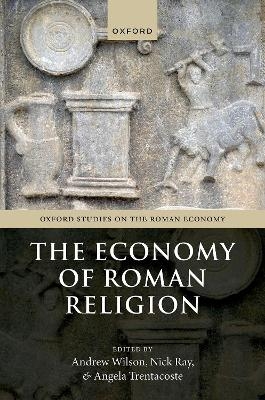
The Economy of Roman Religion
Oxford University Press (Verlag)
978-0-19-288353-7 (ISBN)
The connection between Roman religion and the economy has largely been ignored in work on the Roman economy, but this volume explores the many complex ways in which economic and religious thinking and activities were interwoven, from individuals to institutions. The broad geographic and chronological scope of the volume engages with a notable variety of evidence: epigraphic, archaeological, historical, papyrological, and zooarchaeological. In addition to providing case studies that draw from the rich archaeological, documentary, and epigraphic evidence, the volume also explores the different and sometimes divergent pictures offered by these sources (from discrepancies in the cost of religious buildings, to the tensions between piety and ostentatious donation). The edited collection thus bridges economic, social, and religious themes.
The volume provides a view of a society in which religion had a central role in economic activity on an institutional to individual scale. The volume allows an evaluation of impact of that activity from both financial and social viewpoints, providing a new perspective on Roman religion - a perspective to which a wide range of archaeological and documentary evidence, from animal bone to coins and building costs, has contributed. As a result, this volume not only provides new information on the economy of Roman religion: it also proposes new ways of looking at existing bodies of evidence.
Nick Ray was Assistant Director of the Oxford Roman Economy Project from 2014-2018 and is now with the Maritime Endangered Archaeology (MarEA) project. His research focuses on consumption practices in the Roman world, particularly relating to durable commodities, North African funerary archaeology, and post-conflict/contested heritage. He is co-editor of Burials, Migration and Identity in the Ancient Sahara and Beyond (2019), which contains several co-authored articles. He also co-edited De Africa Romaque: Merging cultures across North Africa (2016) and has published on consumer behaviour at Pompeii and fieldwork in Libya and Morocco. Angela Trentacoste is the Gerda Henkel Stiftung Scholar at the University of Oxford. Her research interests include environmental archaeology, bioarchaeology, ancient farming, mobility, and the economic role of religious activity. Recent publications on Roman themes include contributions to Theoretical Roman Archaeology Journal (2020), Archaeological and Anthropological Sciences (2021), and Roman Animals in Ritual and Funerary Contexts (2021). Andrew Wilson, Professor of the Archaeology of the Roman Empire, University of Oxford. His research interests include the economy of the Roman empire, ancient technology, ancient water supply and usage, Roman North Africa, and archaeological field survey. Recent publications include: The Economy of Pompeii (ed. with Miko Flohr, Oxford, 2017); Trade, Commerce, and the State in the Roman world (ed. with Alan Bowman, Oxford, 2018); Recycling and Reuse in the Roman Economy (ed. with Chloë Duckworth, Oxford, 2020), and Coin Hoards and Hoarding in the Roman World (ed. with Jerome Mairat and Chris Howgego, Oxford, 2022).
1: Andrew Wilson: Introduction: Religion and the Roman economy
2: Jörg Rüpke: What did Religion Cost in Ancient Rome?
3: Charlotte Potts: Investing in Religion: Religion and the Economy in pre-Roman Central Italy
4: Javier Domingo: Cost Differences in Temple Building between Rome and the Provinces
5: David Wigg-Wolf: Moneychangers in the Temple? Coins and Religion in the Roman World
6: Marietta Horster: Cult Economy in the Eastern Provinces of the Roman Empire
7: Marie-Pierre Chaufray: Impact of the Roman Conquest on Temple Economies in Egypt: A Case Study of the Temple of Soknopaios in Dime
8: Michael MacKinnon: Animals in Roman Religion: The Economics behind the Rituals
9: Tony King: Sacred flocks and herds? The Implications of Animal Sacrifice at Rural and Suburban Romano-Celtic Shrines
10: Marta Garcia Morcillo: Sacred Gifts, Profane Uses? The Limits of Donations in the Roman Religious Sphere
11: Koen Verboven: Guilds and Gods: Religious Profiles of Occupational collegia and the Problem of the dendrophori
12: Greg Woolf: Current and Future Directions of the Study of Roman Religion and Economy
| Erscheinungsdatum | 11.07.2023 |
|---|---|
| Reihe/Serie | Oxford Studies on the Roman Economy |
| Verlagsort | Oxford |
| Sprache | englisch |
| Maße | 158 x 240 mm |
| Gewicht | 768 g |
| Themenwelt | Geisteswissenschaften ► Archäologie |
| Geschichte ► Allgemeine Geschichte ► Vor- und Frühgeschichte | |
| Geschichte ► Allgemeine Geschichte ► Altertum / Antike | |
| Geschichte ► Teilgebiete der Geschichte ► Kulturgeschichte | |
| ISBN-10 | 0-19-288353-4 / 0192883534 |
| ISBN-13 | 978-0-19-288353-7 / 9780192883537 |
| Zustand | Neuware |
| Informationen gemäß Produktsicherheitsverordnung (GPSR) | |
| Haben Sie eine Frage zum Produkt? |
aus dem Bereich


